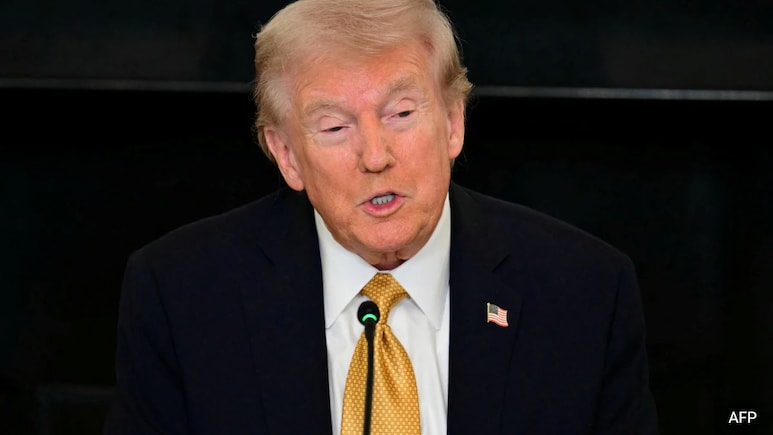
US President Donald Trump signed a flurry of trade deals and framework agreements with Southeast Asian governments on Sunday as his sweep through the region began at a summit in Malaysia.
Trump's first visit to Asia since his return to the White House in January appeared to alleviate some fears in a region already bruised by the trade war sparked by his sweeping tariffs.
He also secured promises of greater cooperation on the key issue of rare earths as Washington scrambles to break China's stranglehold on materials that enable a wide array of modern technology.
Rare Minerals
The US president inked two memoranda of understanding with Malaysia and Thailand, both seeking to "strengthen cooperation" on critical minerals.
The deals, which lack specifics, come as the United States grapples with restrictions on rare earths exports imposed by China -- the world's top producer of the minerals crucial to the auto, electronics and defence industries.
A separate trade deal signed with the Malaysian government says Kuala Lumpur had agreed to increase US access to rare minerals in the country, and to the "expedient development" of the industry "in partnership with US companies".
Another agreement with Cambodia offers the United States access to the kingdom's rare earths industry.
Lynn Kuok, a Southeast Asia expert at Brookings Institution, said that Trump's visit to the region "could help place the relationship on a more positive course, for example, by giving momentum to working-level cooperation on mutually beneficial projects such as critical minerals".
But for the governments that also rely on ties to Beijing, "what is at stake is preserving room to manoeuvre and strategic autonomy," she said.
Malaysia
The agreement Trump signed with Malaysia's Prime Minister Anwar Ibrahim keeps Washington's 19 per cent tariffs in place but grants several exemptions, most notably for agricultural goods.
Malaysia, in return, will "provide significant preferential market access for US industrial goods", including cars and agricultural exports.
Anwar's government has also promised to order 30 aircraft from US maker Boeing -- plus "a purchase option" of 30 more -- and to buy semiconductors, aerospace components and data centre equipment at a cost of $150 billion.
It will also invest $70 billion in the United States over the next decade, and buy more American gas, according to the agreement.
The issue of semiconductor exports remains unresolved, for now, with Trump looking to impose more tariffs on imported chips.
This could have a major effect on Malaysia, the world's sixth-largest producer of semiconductors, which account for about 40 per cent of its exports.
Analyst Michael Wan of financial group MUFG said that "Malaysia's trade deal does not include any agreement on semiconductor and electronics tariffs" -- a key question that "will continue to cloud the picture for Asia's exports".
Cambodia
An agreement with Cambodia, much like the one signed with Malaysia, maintains US tariffs at 19 per cent but offers exemptions.
Cambodia, under the agreement, will maintain zero tariffs on US exports and "allow and facilitate US investment" to explore, extract and process critical minerals and energy resources.
Vietnam
Vietnam agreed with Washington in July to reduce US tariffs on its exports to 20 per cent, averting a 46 per cent rate.
A framework agreement signed on Sunday maintains the 20 per cent rate but offers zero tariffs on some goods, which have yet to be decided.
Vietnam has agreed to "provide preferential market access" for US exports and ease regulatory barriers.
Flag carrier Vietnam Airlines will purchase 50 Boeing aircraft, at an estimated cost of $8 billion.
Other companies have agreed to buy "US agricultural commodities, with a total estimated value of over $2.9 billion", according to a joint statement.
The details will be finalised "in the coming weeks", it said.
A key unresolved issue has to do with US tariffs on goods manufactured in one country but exported to the United States from elsewhere -- a policy largely aimed at China.
Under the July agreement, goods deemed to be "transshipped" face an additional 40 per cent duty.
But many Vietnamese industries use components imported from China, and have no clear definition for what Washington considers "transhipped" goods or what percentage of its parts must be locally produced to avoid higher taxes.
Tariffs on furniture -- 10 per cent of Vietnam's exports to the United States -- also hang in the balance, after Trump introduced extra industry-specific duties.
Thailand
Trump signed a framework trade agreement with Thailand, to be finalised "in the coming weeks", according to a joint statement.
The deal offers exemptions from the 19 per cent tariff rate on Thai goods, in exchange for eliminating nearly all duties on US goods sent to Thailand.
The agreement also includes the purchase of 80 US aircraft valued at $18.8 billion, and more agriculture and energy deals.
(This story has not been edited by NDTV staff and is auto-generated from a syndicated feed.)
Track Latest News Live on NDTV.com and get news updates from India and around the world

